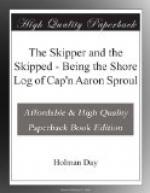There were teams coming along a cross-road ahead of them and teams rattling from the opposite direction toward the fire, approaching along the highway they were travelling. Collisions seemed inevitable. But in a moment of inspiration the Cap’n grabbed the trumpet that hung from its red cord around his neck and began to bellow in his turn:
“Goff-off-errow, goff-off-errow!” It was as nearly as human voice could phrase “Get off the road” through the thing.
The terrifying bulk of the big van cleared the way ahead, even though people desperately risked tip-ups in the gutter. As it tore along, horses climbed fences with heads and tails up. There were men floundering in bushes and women squalling from the tops of rock-heaps.
The Chief of the Ancients did not halt to attend to his duties at the fire. He went howling past on the high seat of the van, over the next ridge and out of sight.
“We’re goin’ to tophet, and you done it, and you’ve got to pay for it,” Brackett wailed over and over, bobbing about on the seat. But the Cap’n did not reply. Teams kept coming into sight ahead, and he had thought only for his monotonous bellow of “Goff-off-errow!”
Disaster—the certain disaster that they had despairingly accepted—met them at the foot of Rines’ hill, two miles beyond Ide’s. The road curved sharply there to avoid “the Pugwash,” as a particularly mushy and malodorous bog was called in local terminology.
At the foot of the hill the van toppled over with a crash and anchored the steaming horse, already staggering in his exhaustion. Both men had scrambled to the top of the van, ready to jump into the Pugwash as they passed. The Cap’n still carried his equipment, both buckets slung upon one arm, and even in this imminent peril it never occurred to him to drop them. Lucky fate made their desperate leap for life a tame affair. When the van toppled they were tossed over the roadside into the bog, lighted on their hands and knees, and sank slowly into its mushiness like two Brobdingnagian frogs.
It was another queer play of fate that the next passer was Marengo Todd, whipping his way to the fire behind a horse that had a bit of wire pinched over his nose to stifle his “whistling.”
Marengo Todd leaped out and presented the end of a fence-rail to Brackett first, and pulled him out.
When he stuck the end of the rail under the Cap’n’s nose the Cap’n pushed it away with mud-smeared hands.
“I don’t, myself, nuss grudges in times of distress, Cap Sproul,” shouted Todd. “You kicked me. I know that. But you was in the wrong, and you got the wu’st of it. Proverdunce has allus settled my grudges for me in jest that way. I forgive and pass on, but Proverdunce don’t. Take that fence-rail. It sha’n’t ever be said by man that Marengo Todd nussed a grudge.”
When the Cap’n was once more on solid ground, Todd, still iterating his forgiveness of past injuries, picked up a tin pie-plate that had been jarred out of the van among other litter, and began to scrape the black mud off the foreman of the Ancients in as matter-of-fact a way as though he were currycombing a horse.




